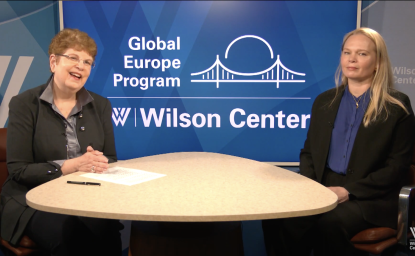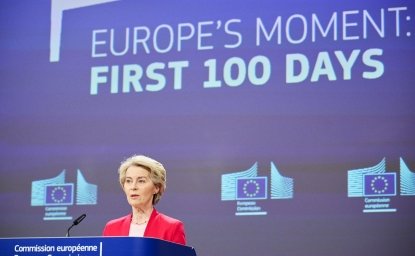Commissioners overseeing the portfolio, or parts thereof
- Henna Virkkunen, Executive Vice-President for Tech Sovereignty, Security and Democracy
- Ekaterina Zaharieva, Commissioner for Startups, Research and Innovation
- Glen Micalleff, Commissioner for Intergenerational Fairness, Youth, Culture and Sport
- Olivér Várhelyi, Commissioner for Health and Animal Welfare
- Hadja Lahbib, Commissioner for Preparedness, Crisis Management and Equality
-
Technology and digitalization looms large in the priorities of many of the European Commissioners as heard in their European Parliament hearings and written in the Political Guidelines for the Next European Commission 2024-2029. However, two key themes emerge from the Commissioners who will most directly work on science and technology matters. First, the Commission intends to push back on online abuse, digital harms, and the immense power that tech corporations hold and exercise. Second, the Commission will seek to accelerate innovation with key investments in research and a fresh focus on facilitating entrepreneurship.
In the Political Guidelines 2024-2029, European Commission President Ursula von der Leyen minces no words: “Tech giants must assume responsibility for their enormous systemic power in our society and economy.” She cites intensified enforcement of the Digital Services Act (DSA) and Digital Markets Act (DMA) as the tools that will allow the Commission to bring these companies to task. Executive Vice-President (EVP) Henna Virkkunen, who is tasked with the Tech Sovereignty, Security and Democracy portfolio, picked up this theme in her confirmation hearing, promising to use DSA and DMA enforcement to both protect European citizens from abuses as well as ensure fair business competition.
For both von der Leyen and Virkkunen, tackling online abuse and digital harms are top priorities, particularly as they pertain to young people. In von der Leyen’s July 18, 2024 statement to the European Parliament as a candidate for her second mandate, she set out the protection of young people as a high priority: “My heart bleeds when I read about young people harming themselves or even taking their lives because of online abuse ... We can never accept this in our society. We will tackle the plague of cyber-bullying. We will take action against the addictive design of some platforms.” In the Political Guidelines 2024-2029 she elaborated further about an EU-wide inquiry on how social media impacts wellbeing, which would target the issue of addictive design, and announced Commission’s plans to develop an action plan against cyberbullying. Four commissioners will work together on these projects: Henna Virkkunen, EVP for Tech Sovereignty, Security and Democracy, Glen Micalleff, Commissioner for Intergenerational Fairness, Youth, Culture and Sport, Olivér Várhelyi, Commissioner for Health and Animal Welfare, as well as the Hadja Lahbib, Commissioner for Preparedness, Crisis Management and Equality.
EVP Virkkunen also highlighted protection of minors as a priority for DSA enforcement, promising to set new guidelines for expectations of online platforms delivering “a high level of privacy, safety and security for minors, in line with the Digital Services Act rules.” She particularly calls out the need to appoint trusted flaggers tasked with protecting minors from cyberbullying and other abuses. As set out in the DSA, these flaggers should be designed by national digital services coordinators and will be responsible for detecting potentially illegal content and alert online platforms.
On a more positive side, the Commission also sees the need to bolster innovation in Europe. Von der Leyen’s Political Guidelines 2024-2029 prioritize “putting research and innovation at the heart of our economy” with the new prosperity plan promising increased research spending, an expansion of the Research and Innovation Councils, strengthened university alliances and new public-private partnerships, and investment in research for strategic technologies. These priorities align with the report on the future of European competitiveness released in September 2024 by former European Central Bank President Mario Draghi. In it, he attributes the innovation gap between Europe and the United States and China to limited public spending on research and a failure to focus existing spending on disruptive innovation.
EVP Virkkunen highlighted the need for Europe’s legal and regulatory frameworks to encourage innovation by reducing unnecessary bureaucracy, while recognizing the role of regulation in keeping people safe. She also called for Europe to reduce its dependency on third countries for tech services. Furthermore, Commissioner Ekaterina Zaharieva, who is tasked with the Startups, Research and Innovation portfolio, emphasized during her confirmation hearing the need to “work relentlessly to achieve an increased budget for research and innovation” and echoed Virkkunen’s emphasis on simplifying regulatory compliance and eliminating red tape.
These priorities, again, echo conclusions from the Draghi report, which underscored the need to reduce onerous regulatory barriers for startups, enabling “inventors to become investors”. The Commission recently unveiled the StepUp Startups project aimed at simplifying regulations and improving other measures to facilitate startup health. As of now, however, there is little additional information beyond noting the work already being done by Startup Europe, the European Innovation Council, and the Capital Markets Union.
Transatlantic Cooperation & Engagement
- Holding tech giants accountable: This priority is likely to be a source of friction in the transatlantic relationship, particularly as the incoming US administration and Congress are expected to largely be against regulating tech companies. Continued meetings of the US-EU Trade and Technology Council would be an excellent way to continue conversations on how to minimize negative impacts for allies and achieve shared goals.
- Protecting children online: The EU and US governments are both working toward a healthier digital life for children, although the key American legislative effort, Kids Online Safety Act (KOSA) has struggled to pass since its introduction in 2022. European officials have the advantage of enforcement tools and mechanisms already provided by DSA, while the US government has achieved buy-in from “Big Tech”. Aligning or harmonizing protection requirements across the Atlantic will make it easier for companies to remain compliant without maintaining costly separate regimes, while also increasing the likelihood that these measures produce a genuine shift toward online safety for young users, who are operating in an Internet without national borders.
- Boosting innovation: Both the EU and the United States are intensely focused on promoting domestic innovation, but this need not come at the expense of the transatlantic relationship. Deep and healthy academic connections between Europe and the United States should allow researchers in both to amplify their work and build off of one another’s research. The joint focus on strategic technologies also means there is an opportunity to ensure that dual-use technologies are developed safely, and with the goal of supporting democratic
Authors



Global Europe Program
The Global Europe Program is focused on Europe’s capabilities, and how it engages on critical global issues. We investigate European approaches to critical global issues. We examine Europe’s relations with Russia and Eurasia, China and the Indo-Pacific, the Middle East and Africa. Our initiatives include “Ukraine in Europe”—an examination of what it will take to make Ukraine’s European future a reality. But we also examine the role of NATO, the European Union and the OSCE, Europe’s energy security, transatlantic trade disputes, and challenges to democracy. The Global Europe Program’s staff, scholars-in-residence, and Global Fellows participate in seminars, policy study groups, and international conferences to provide analytical recommendations to policy makers and the media. Read more

Explore More
Browse Insights & Analysis
The Growing Transatlantic “Big Tech” Rift Explained

The EU's Role in the Future of European Defense




